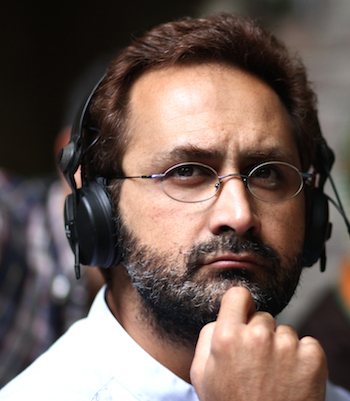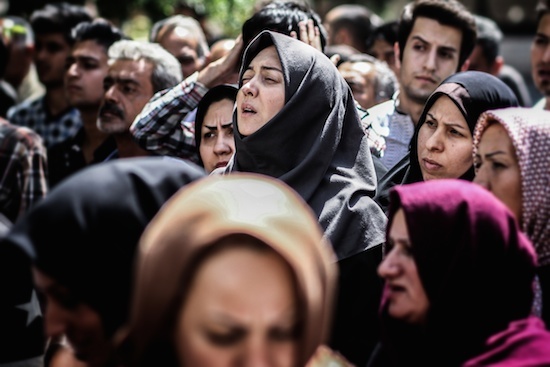No, you didn't just wake up in The Twilight Zone, to find that the last six months of your life are completely unaccounted for. The title above refers to a film, one screening at this year's Venice Film Festival, directed by Iranian filmmaker Vahid Jalilvand.
Wednesday, May 9 is a composite of three stories, though all intertwining and interacting in that wonderful way Iranian filmmakers seem so good at doing these days. Last year, one of my favorite, Tales was a composite of eight stories, eight short films shot that way by Rakshan Bani-Etemad to bypass the censorship board. Jalilvand's film, which he co-wrote with Ali Zamegar and Hossein Mahkam, is instead a tridimensional way to explain a simple, human trait: dissatisfaction.
But Wednesday, May 9 goes deeper, because instead of dealing with our everyday need for things, or our lack of emotional satisfaction, it deals with a more profound sense of insufficiency when we give onto others. Sometimes even donating what we have, to make the world better and completely out of selflessness, leaves us feeling more empty than before -- because it's never enough. What an incredibly provocative premise for a film, especially with all the world asks of us now!
I caught up with Vahid Jalilvand on the terrace of the Excelsior in Venice. I am always amazed when I turn off the recording device at the end of an interview, and find a subject ready to ask me questions, in turn. But that's the wonder of Jalilvand, his interest in the world around him, and the reason why his film worked so well, his women characters felt so intimate to me. And since I could truthfully say that my favorite filmmaker is Jafar Panahi, I felt proud to answer his questions.
How did you arrive at this film?
Vahid Jalilvand: We are a group who always write and work together. We were working on a script and had written the story. One night, at two o'clock in the morning, a friend called. He's a well-to-do friend and said, "I know I'm helping a lot of people because I have a lot of money but I ask myself, if one day I were to lose it all and was left with only an automobile, would I continue to give? Would I give away the very last thing I'm left with?" From there, the idea was born.
Who are the other people you work with?
Jalilvand: Ali Zamegar and Hossein Mahkam. On the next film, only Ali and I will work together.
What is easiest and what is most challenging about working with other creative persons?
Jalilvand: The only thing that is perhaps negative is that times are longer. We took eight months to arrive to a conclusion on this film. The great thing is that we all leave outside the door our "I", the personal ego, so we are three brains, three creative heads placed there, thinking one next to the other. Without any ego.
The women's roles are beautifully written, how do three men manage that so well? Especially the young girl, she's so complete, her desperation...
 Jalilvand: Two answers -- one funny, one more serious. So, first of all, we like women a lot and we love them. In reality all that is needed is to watch well, assess well, understand well, because all of us have grandmothers, mothers, sisters and wives, as boys we had girlfriends, so we can build anything. An old man, a child, a woman, it's just important to observe and inhabit, identify ourselves in our characters.
Jalilvand: Two answers -- one funny, one more serious. So, first of all, we like women a lot and we love them. In reality all that is needed is to watch well, assess well, understand well, because all of us have grandmothers, mothers, sisters and wives, as boys we had girlfriends, so we can build anything. An old man, a child, a woman, it's just important to observe and inhabit, identify ourselves in our characters.
Artists are always pioneers or even better, prophets. What do you think of this newfound understanding between the USA and Iran? From an artistic point of view too.
Jalilvand: (Does a thumbs up, with both hands) I'm not a political man so I don't like to talk about politics, but the Iranian people have so much in common with the American people. I see so much good! A great future.
Can cinema be a good way to create a bridge between cultures?
Jalilvand: If the two people, Iranians and Americans can come together through cinema, art, culture, architecture and sport they can always find a common ground. Of course cinema, but also sports unite.
Are you a musician?
Jalilvand: Sitar and daf, which is a type of drum, a circle that you hold and you play. Daf I've been playing for twenty years. I was a teacher when I was younger. Sitar I like to play for myself when I'm alone.
What is the first film you ever remember watching in your life?
Jalilvand: We watched a lot of films on TV about WWII when I was growing up, with the Partisans fighting the Germans... I loved them and even replayed the films. In my courtyard, there was a corner with trees and outside the gate, concrete. So I pretended that under the trees were the Partisans and outside, the Germans. And, I don't know why, but the Partisans always won!
Three words to describe yourself to someone who doesn't know you?
Jalilvand: There is a dialogue in my film, that repeats in all three episodes. The new husband tells the girl, "you're unfair, unjust". In another scene, the wife tells the donor, "you're unjust". This adjective that we can give people, "you're unfair" I can only say about myself that I'm fair, I'm just. This being just or unjust is difficult to translate properly because it's part of the Iranian cultural baggage. From a certain point of view a just/fair person is the kind of person who, once they have shaken your hand, will never pull it back. This is one way I define myself. I'm also sincere, I like sincerity. And I'm bitter.
And finally, your favorite filmmaker?
Jalilvand: Ron Howard, because he makes me feel, experience emotions. I like films that make me feel something. Also Alejandro González Iñárritu but not for Birdman, where I think he's gotten too caught up in the equipment.
All images courtesy of La Biennale di Venezia, used with permission.

